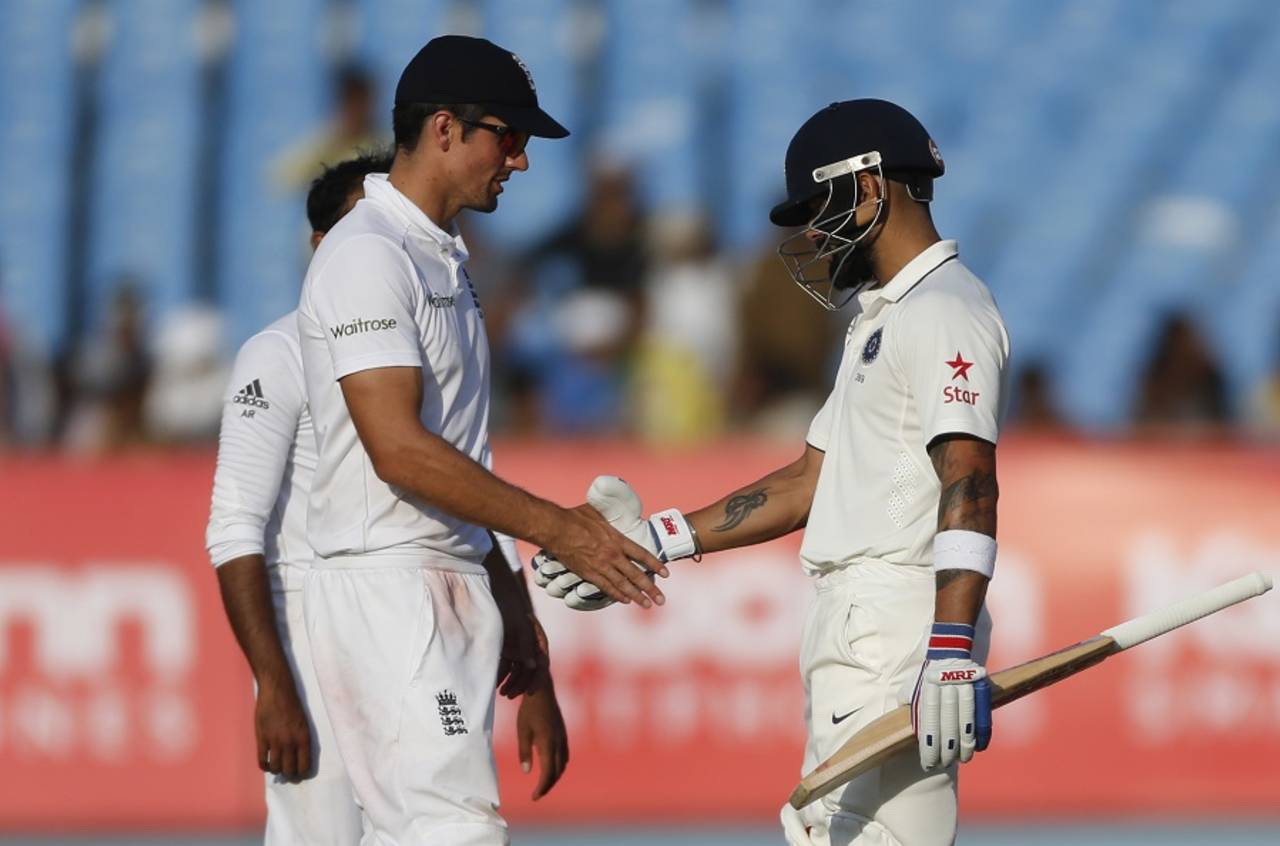Why geography is increasingly ceasing to matter in Test cricket
A Test tour is no longer challenging for the main reason it used to be: unfamiliarity
Jon Hotten
Nov 16, 2016, 10:30 PM

England forced India to play for a draw in home conditions? What has the world come to? • Associated Press
England's baptism in Rajkot ended in curious triumph, mid-over, and with the visitors if not ascendant then floating happily above expectations. Alastair Cook glowed, a 30th Test century in the books. "We proved to everyone else we can play…" he said. He called Ben Stokes "golden" and reckoned Haseeb Hameed was "pushing me close to retirement".
Was all of this good humour some form of survivor high? Or perhaps he was demob happy, having set in motion the idea that he will, in the not so distant future, pass on the captaincy and devote himself even more ascetically to batting.
Someone somewhere will one day write a thesis on Cook's public pronouncements, comparing them to actual events on planet Earth. Until that day, all we can assume is that the captain was about as pleased as he's ever been with a drawn Test match.
England, like most of the teams hovering around the top of the rankings, are a decent side. They have the potential to be better than that. Their work ethic is one thing about them that cannot be questioned, and perhaps it's that sense of effort that felt most impugned by the many predictions after their defeat in the Dhaka Test that they may lose 5-0 in India.
That particular catastrophe has been averted, but there's a wider pattern in evidence this year that runs contrary to the trend of teams having been stronger at home this decade than in any other over the last half-century or so. In 2016, England have won in South Africa, and been part of a drawn series at home to Pakistan. India won in the West Indies, Australia won in New Zealand, South Africa have swatted aside Australia in Australia. England have drawn in Bangladesh.
Asia still has its turners, but England's captain has played often and well enough to have compiled nine Test centuries there. It is all more familiar
The hostility of overseas conditions was once a given. Cricketers travelled less often: England, for example, may go to Australia, India, Pakistan, West Indies and so on in rotation. A fine Test player might tour each country twice in a career. It is a long way removed from the current high-volume, multi-format, multi-franchise life, in which a player can appear in India, Australia, England and West Indies in a single year as a matter of course. The opposition are less foreign too. Kevin Pietersen was the first England player to speak of the benefits of the early years in the IPL, the great exchange of information and knowledge that took place between new team-mates, and the way that franchise cricket broke down international boundaries. The nature of reputation changed. It was hard to hate a guy you'd spent two months in harness with. There is a new familiarity to it all.
Coaching has changed. England, after a spell with Mushtaq Ahmed, are being advised by Saqlain Mushtaq. Their most recent head coaches have included two Zimbabweans and an Australian. Knowledge flows across borders in a different way. Technology means any batsman or bowler can be dissected frame by frame, match by match. A lot of the mystery of touring has been taken away. Five-star hotel rooms are the same wherever you are.
For England, the weather - specifically the heat - has been an enemy too. Yet we have never known more about how much the England captain sweats than we do now. Every possible disadvantage is minimised in advance.
Conditions too have homogenised. Australia, once the home of the much-feared WACA, now has drop-ins at many grounds. West Indies have lost the sheen of Sabina Park in favour of new stadiums constructed with outside dollars. Asia still has its turners, but England's captain has played often and well enough to have compiled nine Test centuries there. It is all more familiar.
The disparities now are in finance and political clout. The best teams are often the richest, either as countries or as individual players. Test cricket's inequalities are many, but they are no longer all about geography. A tour that goes wrong early seems to stretch into infinity, and teams will always boom and bust in cycles (just ask Steve Smith). A long Test tour is the toughest undertaking in cricket, but like so much else in 2016, it all feels far less certain than it once did.
03:16:38 GMT, November 17, 2016: The article originally said there have only been two comprehensive home series victories this year. That sentence has since been deleted
Jon Hotten blogs here. @theoldbatsman